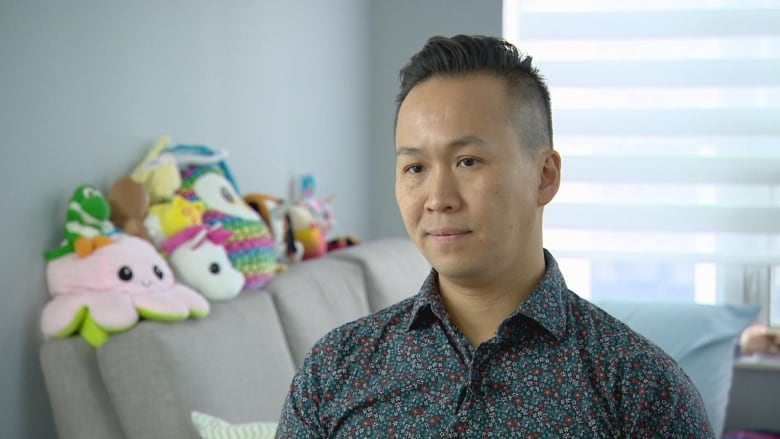Back to school means back to basics this fall as Canadians come up against high prices
Donated goods offered across the country by schools, libraries, community groups

At a school in Moncton, N.B., the doors to the gymnasium opened at 9 a.m. sharp on Aug. 19. Inside, students, parents and community members were greeted by a spread of second-hand clothes, backpacks, shoes, boots and books. Music played over the speaker; kids were in high spirits.
Queen Elizabeth School was hosting its first-ever back-to-school shop, an initiative spearheaded by vice-principal Kyle Bishop and the owner of a local consignment store in nearby Riverview, N.B., called Ready, Set, Grow.
The shop gave families a chance to choose from donated items ahead of the first day of school — without paying a cent.
"Our parents do the best that they can with the reality that they have," Bishop said, adding the school has a large newcomer population. "And so when this opportunity came up, I just thought of all the families that this could benefit immensely."
As inflation continues to put pressure on the cost of just about everything — from food to clothes to school supplies — Canadians across the country are preparing for the back-to-school season by turning to second-hand options as a way to save money.

Several recent surveys indicate that parents are being more mindful of back-to-school costs this year.
In a questionnaire from NerdWallet, a personal finance company, 27 per cent of respondents said they will spend less on school supplies this year compared with previous years due to inflation, while 20 per cent said they had plans to purchase or buy back-to-school items second hand.
- Get the news you need without restrictions. Download our free CBC News App.
Conducted by the Harris Poll, the survey included 303 Canadian adults and is considered accurate within 6.4 per cent.
"It was a good way to start the school year, regardless of anything," Bishop said. "Just to have teachers and the administration talk with parents, see the kids that we haven't seen in a couple months, see if they're excited for school."
'Everyone's really feeling the pinch'
As parents across the country say they're struggling with back-to-school costs, community organizations are trying to meet a demand that is outpacing donations.
One Calgary organization said the demand for backpacks jumped by 76 per cent this year, while the founder of a charity that operates across Newfoundland and Labrador said more than 260 people have registered — and 200 more are on a waiting list — for the organization's back-to-school necessities program.
A line snaked outside the entrance to the Cape Breton Regional Library in Sydney, N.S., one morning last week, as the branch hosted its first kids' "clothing swap" — where a donation gets you a shopping voucher.
On this particular day, that criteria didn't apply, as parents and children rummaged through clothes before the beginning of the school year.
Sydney resident Natasha Kinslow, who was there with her son, said affordability has been extra challenging this year.
"Everything costs a lot. It's overpriced. Everything. Especially being a single mom, it's hard," Kinslow said, adding that the clothing swap likely saved her a lot of money.

Jannette Vusich, assistant regional program co-ordinator at the library, previously organized two adult clothing swaps thanks to demand from patrons. More than 300 people attended those events, she said.
Vusich said the library received hundreds, possibly thousands, of donated items.
"There were kids with every parent, and they were going through and finding their own clothes — and they were very excited to show us the cute things they found," she said.
"Everyone's really feeling the pinch, and people have been telling us how excited they are to have this option available," Vusich said, noting that library patrons and other non-profits that the library works with have stressed the financial pressures Canadians are facing.
Vusich said she thinks there's been a gradual shift away from the stigma of poverty and that events like the one held at the library help because the whole community participates.
Thrifting has become trendy, especially among teenagers, she said, and people are generally looking for more sustainable alternatives to fast fashion — where cheap clothes are mass produced quickly and then discarded.
"I think everyone is taking home $100, $150 worth of clothing, and we really hope it helps our community with their back-to-school needs," Vusich said.
Changing attitudes toward buying second hand
The mentality toward second-hand shopping has changed significantly over the last few years — "not just because people are looking to save money, but people want to recycle," said Barry Choi, a Toronto-based personal finance expert.
"Anyone who's got young children realize they grow so quickly, so why buy these [new] clothes that they're just going to outgrow within a few months?"

For families who are shopping for back-to-school items, Choi said his No. 1 recommendation is to make a list beforehand and ensure you don't already have the things your child says they need.
"The last thing you want is to show up at the store. You start shopping, you and your spouse [are] like, 'Oh, do we need this or do we need this, do we need that?' And you end up buying all these things that you already have."
For Bishop, the vice-principal in Moncton, the back-to-school shop is just one way that the school can help its community during times of financial duress.
The school also partners with other community organizations to host a school supplies drive, as well as breakfast and lunch programs. It's hoping to turn the back-to-school shop into a seasonal event.
"Kids go [to school] to learn. That's extremely important," Bishop said.
"But we are part of the community and we support the community, not just in academics but in all facets of a child's life."
With files from Deana Sumanac-Johnson and Nazima Walji
